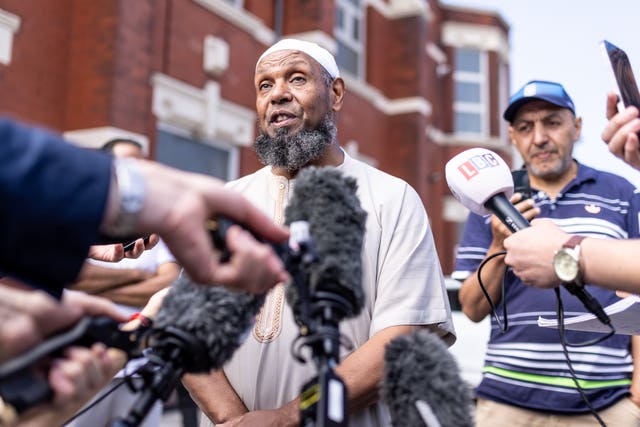Mosque chairman feared rioters would break in and burn building down
Police officers suffered serious injuries in the disorder in Southport, Merseyside, on Tuesday night.

A mosque chairman and imam has described being trapped in the building while violence erupted outside as “terrifying” but said the supportive community response has been “humbling”.
Ibrahim Hussein said he is at a loss as to why people shouting abuse and throwing missiles had targeted Southport mosque and that he had feared rioters would at one point break in and “burn the place down”.
Police officers suffered serious injuries in the disorder on Tuesday night, with Prime Minister Sir Keir Starmer saying rioters had “hijacked” a vigil for the victims of a stabbing attack at a Taylor Swift-themed holiday club.
Mr Hussein said the experience, in which he and around eight other people were trapped inside the mosque, had been “terrifying”.
“It was absolutely, awful, horrendous,” he told reporters on Wednesday.
Mr Hussein, who only escaped at midnight with a police guard, added: “We couldn’t understand this viciousness that was going on, and even the police were taking a hammering from this lot.”
Asked if he thought the far-right had hijacked his town, Mr Hussein said: “Naturally. This is a beautiful town.
“We’ve lived here 30 years, no bother at all. We love this community. The community loves us. We don’t have any issues.”
He thanked police for their efforts, saying they “took a very bad beating”.
He said: “I would like to thank them for their support because at one point we thought they (the rioters) were coming in and they were going to burn the place down.”
He said he understood why the 17-year-old suspect in the killings has not been named, but it “would have been helpful if they (the police) had said that he is not Muslim”.
He added: “Not that it makes a big difference because, even if he is a Muslim, why should that reflect on the whole community?”

Soyful Alam, a former imam at the mosque, said people “have a right to be angry” after the devastating attack on young children.
He told the PA news agency: “Everybody – the whole nation – is shocked by what happened (on Monday).
“People are upset, and at the same time they are angry because incidents of this nature keep happening.”
But he said no matter what the background of someone who commits a crime, the community they come from or are associated with should not be targeted.
He added: “People need to be told that a crime is a crime and a criminal is a criminal.
“Whoever (that person may be), he or she is responsible for a crime and to go targeting people who may be of the same colour or may be from the same region in the world isn’t justified, it isn’t a humane way of going about things.”
The mosque was open on Wednesday, with Mr Hussein saying he will “pray for the whole of Southport”, including the victims of Monday’s attack, the police and the wider community “to stay as beautiful as it has always been”.
Speaking about the response from locals, many of whom took flowers to the mosque and organised repairs, he said it had been “humbling”.
But he added that the Muslim community still feels vulnerable, saying he had seen messages the day before indicating something was going to happen.
Iman Atta, director of the Tell Mama organisation which monitors Islamophobia in the UK, said her organisation had “received messages from Muslim communities, including visibly Muslim women, worried about the current climate”.
She said Tell Mama had “worked tirelessly” on Tuesday to try to identify “various far-right agitators online spreading misinformation” and had reported some “extremist racist and harmful materials to the police”.
She added: “We must not lose our sense of mutuality and support for each other by those who seek to divide us, especially by those with large platforms online and more mainstream traction.
“We must also work collectively in our politics, media and wider society to challenge and remove scapegoating and stigmatising narratives that collectively link refugees, migrants, Muslims and other minority communities to violence and crime.”
She added that she has been “heartened by members of the public standing up for Muslim communities locally, with offers of support to help clean up and who reject the racialised misinformation online”.





